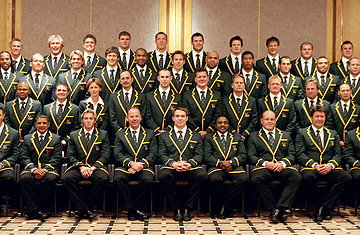
The South African national rugby union team players pose in Johannesburg.
Among the rugby players who flew into Paris this week for the World Cup, few feel as much pressure to win as do the Springboks. South Africa's national rugby team was once among the most powerful symbols of the apartheid regime, and as such a prime target of the international sports boycott aimed at ending white rule. Then, in 1995, one year after Nelson Mandela's election as President inaugurated the era of democratic majority rule, South Africa hosted (and won) the Rugby World Cup. As tens of thousands of fans — almost all of them white — erupted in the stands, Mandela donned a Springbok jersey and lumbered on to the field to hug the team's captain. For many, the moment symbolized white acceptance of the new order, and even many who cared nothing for rugby were moved to tears. Apartheid, it seemed, was finally dead.
Or was it?
The Springboks arrived in Paris this week with a fair shot at reaching the final on October 20. Yet, despite a 12-year hiatus since its last victory, the team does not look very different today than it did right after apartheid's collapse. In a country where black people make up 80% of the population, the 30-man rugby squad includes only six players of color — only one more than it had fielded in the 2003 World Cup in Australia, where a white Springbok player notoriously refused to room with a black teammate. Zola Yeye, who last year became the first black team manager in the Springboks' 101-year history, says the team's racial makeup is an "indictment" of South African rugby, and a product of "a lot of resistance" to integration.
That fact is deeply uncomfortable for a country whose white population treats rugby with the almost religious reverence that Brazilians reserve for soccer. For years, the national rugby system was tightly interwoven with the institutions of apartheid, its players and administrators nurtured in the same educational institutions from which the regime recruited its leaders. The Afrikaner Broederbond (Brotherhood), a secretive formally structured power elite that ran the country's key institutions helped choose Springbok rugby captains, just as they chose military commanders and prime ministers. "Rugby was always seen as apartheid at play," said Andy Colquhoun, a leading South African rugby commentator, in Paris this week. Even now, he adds, "it is a crucial part of the white psyche. It is South Africa." Or, at least, white South Africa.
The racial makeup of the current Springbok squad sparked weeks of anguish among politicians back home, concerned by the image it projects into the world, but divided over how to address the problem. Despite the government's upbeat post-apartheid "rainbow nation" theme, official statistics underscore the persistence of harsh inequalities: Last year more than 60% of black South Africans scraped by on less than $100 a month — up from 50% in 1996. By contrast, only 4% of whites earn that little, up from 2% in 1996.
"At the very top there is a lot of integration," says Frans Cronjé, head of development for the South African Institute of Race Relations in Johannesburg. "But at the bottom it is a different picture." Cronjé says the Springbok team illustrates the lack of access by black teenagers to the elite high schools that groom most of the country's rugby stars. While education was legally segregated under apartheid, today it is prohibitive fees that keep all but a handful of black students out of the best schools.
Then again, rugby has never been the first-choice game among the black majority, and in South Africa's national soccer team, only one or two white players make the cut. "You can tell a mostly white high school when you drive by its rugby field," Cronjé says. "Black schools have soccer fields."
Still, Springbok manager Yeye faults the white-dominated club and provincial level rugby system for failing to recruit and groom black players. "We've got 40 million blacks at home and I've got only six of them in the squad," he says. "I mean, Africans have played rugby in South Africa since the 1800s."
Discord over the Springbok team has also been stirred by the fact that some of its star players have recently signed lucrative contracts with European clubs, which begin after this World Cup. Annoyed that some of its best players were leaving South Africa, the country's rugby authorities threatened to bar them from future Springbok squads. The decision was reversed this week — they do need their best players to mount a challenge for World Cup glory, after all.
But this may be the last time the Springboks field such a heavily white lineup. South African politicians have warned that future teams would have to integrate, even at the expense of winning abroad. Ultimately, says Yeye, racial quotas might be the only way to shake the Springboks' racial tint.
Despite the political furor over the team's makeup, the team takes to the field with the blessing of its most famous fan, Nelson Mandela, who arrived in Paris this week and immediately invited the players to his hotel.
Mandela was in town to be honored by the International Rugby Board, which on Thursday presented the former President with a crystal rugby ball bearing the inscription: "For what you have done during the 1995 World Cup to unite your nation under the banner of rugby." It will take more than another Springbok victory, however, to overcome the inequalities that persist in South Africa 13 years after apartheid.
